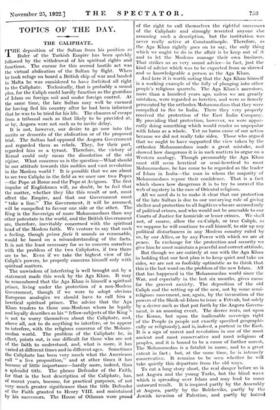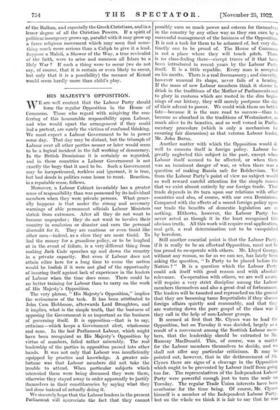TOPICS OF THE DAY.
THE CALIPHATE.
THE deposition of the Sultan from his position as Ruler of' the Turkish Empire has been quickly followed by the withdrawal of his spiritual rights and functions. The excuse for this second hostile act was the virtual abdication of the Sultan by flight. When he took refuge on board a British ship of war and landed in Malta he was considered to have forfeited all right to the Caliphate. Technically, that is probably a sound plea, for the Caliph could hardly function as the guardian of Islam on foreign soil and under foreign control. At the same time, the late Sultan may well be excused for having fled his country after he had been informed that he was to be tried for his life. The chances of escape from a tribunal such as that likely to be provided at, or by, Angora were not such as to invite delay.
It is not, however, our desire to go now into the merits or demerits of the abdication or of the proposed trial. The Sultan had opposed the Angora Government and regarded them as rebels. They, for their part, regarded him as a tyrant. Therefore, the victory of Kemal could only mean the dissolution of the old regime. What concerns us is the question—What should be our attitude towards this sudden and vast revolution in the Moslem world ? It is possible that we are about to see two Caliphs in the field as we once saw two Popes —the Pope at Rome and the Pope at Avignon. The first impulse of Englishmen will, no doubt, be to feel that the matter, whether they like this result or not, must affect the Empire, and that our Government must " take a line." The Government, it will be assumed, will be compelled to favour one side or the other. The King is the Sovereign of more Mohammedans than any other potentate in the world, and the British Government are, therefore, inevitably concerned with the spiritual head of the Moslem faith. We venture to say that such a feeling, though prima facie it sounds so reasonable, would be based on a misunderstanding of the facts. It is not the least necessary for us to concern ourselves with the problem of the two Caliphates, if two there are to be. Even if we take the highest view of the Caliph's powers, lie properly concerns himself only with spiritual matters.
The unwisdom of interfering is well brought out by a statement made this week by the Aga Khan. It may be remembered that the Aga Khan is himself a spiritual prince, living under the protection of a non-Moslem Government, though if we were to adopt obvious European analogies we should have to call him a heretical spiritual prince. The advice that the Aga Khan tenders to those non-Moslems whom he legally and loyally describes as his " fellow-subjects of the King " is not to worry themselves about the Caliphate, and, above all, not to do anything to interfere, or to appear to interfere, with the religious concerns of the Moham- medan world. The problem of the Caliphate he, in effect, points out, is one difficult for those who arc not of the faith to understand, and, what is more, it has varied at different times and in different ages. Sometimes the Caliphate has been very much what the Americans call " a live proposition," and at other times it has become of little importance—hardly more, indeed, than a splendid title. The phrase Defender of the Faith, for that is the best description . of the Caliphate, has, of recent years, become, for practical purposes, of not very much greater significance than the title Defender of the Faith granted to Henry VIII. and maintained by his successors. The House of Othman were proud of the right to call themselves the rightful successors of the Caliphate and strongly resented anyone else assuming such a description, but the institution was never really active at Constantinople. Therefore, as the Aga Khan rightly goes on to say, the only thing which we ought to do in the affair is to keep out of it and to let the Moslems manage their own business. That strikes us as very sound advice—in fact, just the kind of advice which was to be expected from so shrewd and so knowledgeable a person as the Aga Khan.
And here it is worth noting that the Aga Khan himself is a working example of the folly of plunging into other people's religious quarrels. The Aga Khan's ancestors, more than a hundred years ago, unless we are greatly mistaken, were regarded as heretics, and were so fiercely persecuted by the orthodox Mohammedans that they were compelled to flee to India. There they very properly received the protection of the East India Company. By providing that protection, however, we were appar- ently doing something which would render us unpopular with Islam as a whole. Yet no harm came of our action because we did not really take sides. Those who argued that we ought to have supported the view taken by the orthodox Mohammedans made a great mistake, and showed how dangerous it is in such matters to argue on a Western analogy. Though presumably the Aga Khan must still seem heretical or semi-heretical to most Mohammedans, he has come to be regarded as the leader of Islam in India—the man in whom the majority of Mohammedans repose their confidence. That is a fact which shows how dangerous it is to try to unravel the web of mystery in the case of Oriental religions.
All we need do is to make it clear that our protection of the late Sultan is due to our unvarying rule of giving shelter and protection to all fugitives who are accused only of political crimes, and who would not be amenable to our Courts of Justice for homicide or lesser crimes. We shall not, of course, allow the ex-Caliph, or true Caliph, as we suppose he will continue to call himself, to stir up any political disturbances in any Moslem country ruled by us, by our Allies, or by any Power with which we are at peace. In exchange for the protection and security we give him lie must maintain a peaceful and correct attitude.
But though we are entirely at one with the Aga Khan in holding that our best plan is to keep quiet and take no sides, we are not so foolishly optimistic as to think that this is the last word on the problem of the new Islam. All that has happened in the Mohammedan world since the War, and especially in the last six months, gives cause for the gravest anxiety. The deposition of the old Caliph and the setting up of the new, not by some semi- religious movement, nor, again, by the invocation of the powers of the Sheik-ul-Islam to issue a Fetvah, but solely by a decree such as that put forth by the Angora Govern- ment, is an amazing event. The decree rests, not upon the Koran, but upon the inalienable sovereign right of the People (a people not exactly specified geographi- cally or religiously), and is, indeed, a portent in the East. It is a sign of unrest and revolution in one of the most ancient and most conservative and most religious of peoples, and it is bound to be a cause of further unrest. The Mohammedan is a fatalist in name, and to a great extent in fact ; but, at the same time, he is intensely conservative. It remains to be seen whether he will take quietly this departure from the old ways. To cut a long story short, the real danger before us is not Angora and the young Turks, but the blind wave which is spreading over Islam and may lead to some untoward result. It is inspired partly by the Assembly at Angora, partly by the Bolsheviks, partly by the Jewish invasion of Palestine, and partly by hatred of the Balkan, and especially the Greek Christians, and in a lesser degree of all the Christian Powers. If a spirit of political insurgency grows up, parallel with it may grow up a fierce religious movement which may soon find some- thing much more serious than a Caliph to give it a lead. Suppose a Mandi, a Shower of the Way, a true revivalist of the faith, were to arise and summon all Islam to a Holy War ? If such a thing were to occur (we do not say, of course, that it is certain or even likely to occur, but only that it is a possibility) the menace of Kemal would seem hardly more than child's play.











































 Previous page
Previous page